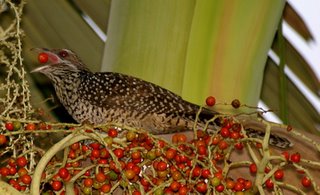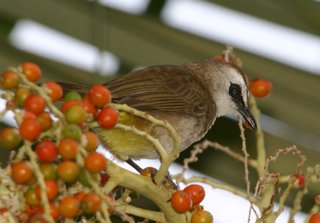 Reviewing my earlier images of koels caught in the act of raiding these fruits, I found that I have evidence that Asian Koels (Eudynamys scolopacea) regularly swallow the fruits (see above) but have yet to actually see them regurgitate the seeds.
Reviewing my earlier images of koels caught in the act of raiding these fruits, I found that I have evidence that Asian Koels (Eudynamys scolopacea) regularly swallow the fruits (see above) but have yet to actually see them regurgitate the seeds.Yellow-vented Bulbuls (Pycnonotus goiavier) are similarly attracted to these fruits, but only when the starlings are not around. But these bulbuls apparently have a smaller gape than the above two birds as they are not able to swallow the nearly rounded 10x12 mm fruits. Instead, they peck on the red fruits to remove pieces of the soft outer covering, leaving the fruits with patches exposing the seed surface still attached to the bunch.


Obviously the starling, koel and bulbul are inefficient seed dispersers as far as the Alexandra palm is concerned. Depositing the seeds at the base of the parent palm is not advantageous to the plant at all.
I wonder whether there are any animals that actually disperse these seeds. As an exotic palm introduced from the warmer regions of Eastern Australia, it is very possible that the seed dispersers are absent in Singapore.
Comment by R. Subaraj: It would be interesting to find out if some of our local animals like plantain squirrels, actually help disperse the large seeds of some of our exotic palms.
Yes, I have seen this before. However, yellow-vented bulbul will be able to swallow other smaller fruits / berries. A week ago, I sighted the yellow-vented bulbul feeding on Osmoxylon berries.
ReplyDelete